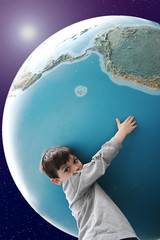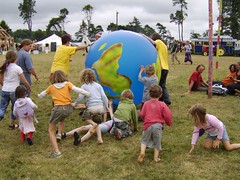As parents, we often hear predictions about the necessity for our children to prepare for a new and “global” world. While some people explain that the roots for global interactions were planted centuries ago, current electronic and transportation technologies make people across the globe even more connected and interdependent. So how can we prepare our children and give them experiences to help them become globally literate?

Of course, travel is an obvious way to help children increase their cultural currency, but going to camp also helps foster global thinking and skills in specific ways. Summer camp is a place where children from around the world and different parts of the United States connect with each other, build lifelong friendships, try new things and practice living together. At AFSC camps for example, while just a few campers come from abroad, they bring a great deal to camp life and community as a whole. Everyone benefits from a diverse mix of kids at camp. Kids can practice a language and will definitely learn about different customs with daily interaction and time to soak it all in. Most importantly, they will learn how to respectfully engage with people with different views, who may not approach everything the same way.

In her book, Growing Up Global:Raising Children to Be At Home in the World, Homa Sabet Tavangar says that the first step towards developing a global outlook requires “embracing the mind-set to make a friend and be a good friend.” Making friends means practicing universal qualities like empathy and respect, and building lasting friendships at camp is a huge part of the total experience. Counselors and staff are trained and at the ready to help campers grow in this area, build new skills when necessary and model caring for others. Tavangar explains that versions of the Golden Rule, or “treat others as you wish to be treated,” permeate all cultures and faith traditions and elaborates on these in her book. When children embrace the universal values of caring for each other, they employ humility, curiosity and compassion which then leads to making true friends—and that’s what makes a world citizen.
So, wherever we go in the world, it’s the experience of breaking down the elements of diverse cultures and seeing what makes them similar or distinct, that prepares us for relating to each other. For kids, a baby step towards negotiating new cultures can be overcoming the fear of new foods or being away from home at camp where things are “different”—after all, every camp, and each year, has it’s own special character or culture. For example, many campers bond over the issue of learning to like new foods and it’s that kind of experience that prepares children for the future.

Growing up global is not just about preparing to do business in the world economy. It’s about having the comfort and desire to connect with the Kenyan dad who coaches a local soccer team, a Turkish neighbor with distinct fashion style or an American who expects consistent electrical power! Ultimately it’s about being curious about differences instead of afraid of them and valuing making friends with the diverse people we meet. Psychologists link friendship to an individual’s health and ultimately to the ability to survive—so friendships are key to feeling at home in our individual skins as well as feeling at home on our planet.
Our experiences at summer camp are a key component in raising globally aware and confident children. The friendships and lessons learned at camp will last long after camping season ends as campers continue to expand their horizons, stay connected with friends across time and geography and find their life’s passions. How do you plan to raise global kids and make camp a part of their preparation? Have you read Growing Up Global or used any of Tavangar’s suggestions? We’d love to hear how camp contributed to defining your world view!
Deborah-Eve

Thanks for the images Amer Khalid, gavinandrewstewart and woodleywonderworks.

 570-798-9831
570-798-9831